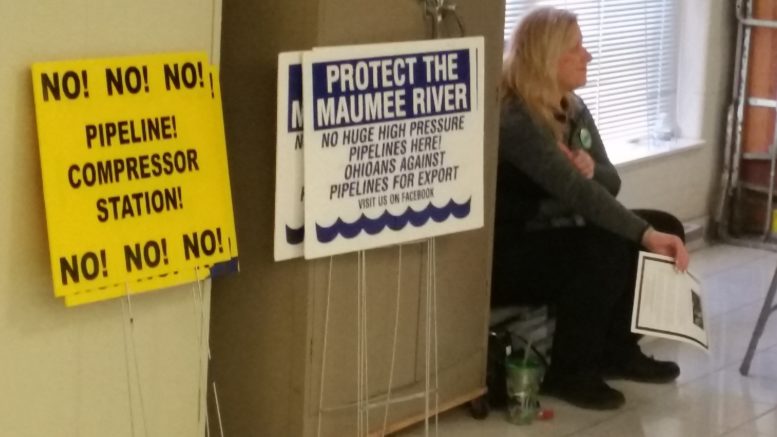By JAN LARSON McLAUGHLIN
BG Independent News
Waterville area residents are sick just thinking about the toxins that a pipeline compressor station could pump into their air.
More than 500 showed up Wednesday evening to say they won’t sit by quietly and let the facility be built as part of the proposed Nexus pipeline. The natural gas pipeline would run 255 miles from eastern Ohio, across the state, to Michigan and end in Canada.
Along its route, it will pass through Wood County, north of Bowling Green, then through Waterville. When it gets to Waterville Township, a compressor station is proposed off Moosman Road, south of Neapolis Waterville Road.
Compressor stations are used to pump natural gas through the pipelines, and are located at intervals along the line to pressurize the gas to keep it moving.
Residents packed a school in Waterville Wednesday evening to protest plans to put the station in their community. There were so many people who wanted to testify at the Ohio Environmental Protection Agency hearing, that the EPA skipped the program and went straight to the public comments.

Residents pack school to testify against pipeline compressor station.
“This is one of the larger crowds we’ve ever had at an EPA hearing,” said Mike Settles, of the Ohio EPA.
Settles explained that his agency only has authority over the station’s air emissions. FERC is the agency that must approve the actual pipeline. “Safety is not our issue. I know that’s not what you want to hear,” Settles said.
The air pollutants typically released from the compressor station include such items as nitrogen oxide, carbon monoxide, sulfur dioxide, methane, benzene, acetaldehyde, formaldehyde and toluene.
Barry Booth traveled five hours from his home in Carroll County, where the Nexus pipeline begins, to warn Waterville residents of what they can expect from having a compressor station as a neighbor.
“We are living in it,” he said, of the toxins spewing out from the station near his home. “It will get on your kids’ toys. It will get onto everything.”
Booth said both he and his wife have been sickened by emissions from the site.
“Wake up people, we’ve got to band together,” Booth said.
One by one, Waterville area citizens stood up to protest the proposed compressor station. Waterville Township Trustee Karen Schneider said the station would have a “chilling effect” on the community. She listed some of the effects associated with the emissions, such as eye and lung problems and cancer.
“We should not have to wait five to 10 years to find out the negative effects,” she said.
Stacy Owen, who lives less than half a mile from the station site, listed further issues associated with the emissions, like genetic mutations, skin rashes, and damage to the liver, kidneys and nervous systems.
“How is it possible the EPA can approve this?” she asked, noting that 12,000 people live within three miles of the compressor site. “It is your job to protect our community.”
Deb Swingholm said the prevailing winds will blow the emissions into the most populated areas. “It will carry any pollutants directly into town.”
Anthony Wayne Superintendent Jim Fritz said five of the district’s six schools are within a three-mile radius of the proposed compressor site. The air intake systems are not made to deal with the emissions expected, he said.
Walt Lange questioned the value of calculating the “average” emissions for the permit. “The problem with that is it don’t mean squat,” he said, explaining that the average is meaningless if it peaks at dangerous levels.
“How would you like to be out in the backyard with your kids,” when those high levels are released into the air, Lange said.
Jill Lipinski listed nosebleeds, dizziness and fatigue as symptoms of living with the emissions. “I’m terrified what this means to my community.”
Lisa Kochheiser, of Common Sense Energy Coalition, told the crowd that the EPA is powerless to stop the compressor station. However, since Waterville has a city charter, Kochheiser said the community could amend the charter to ban all pipelines.
“You have the power,” she said. “Now is the time for the community to just say ‘No.’”
“It is up to us to assert and protect our rights,” she said.
Terry Lodge, an attorney with Common Sense Energy Coalition in Wood and Lucas counties, said the EPA will not be monitoring the emissions from the station. Instead, the pipeline company will report any violations, he said, questioning the value of self-reporting.
Lucas County Commissioner Pete Gerken announced to the crowd that the board of commissioners took action earlier in the day to oppose the compressor station.
The Wood County Commissioners took action last year to oppose pipeline projects that would cross through this county. At that point, there were four lines in the planning stages.

